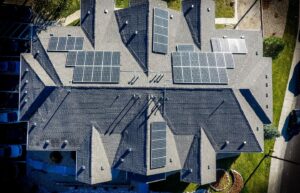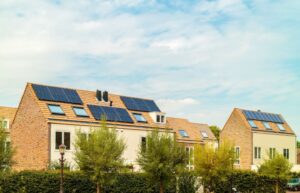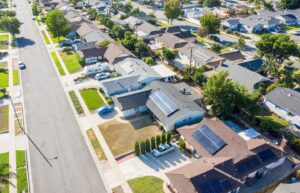Can you heat a house with solar panels in Littleton, CO? With the state’s abundant sunshine and the rising popularity of solar energy, this is an exciting question. Whether you’re an eco-minded innovator or an environmentally conscious homeowner, you may be surprised to learn that heating a home with solar panels is actually an achievable goal.
But how? What specific requirements do you need to know moving forward? In this blog, we’ll lay out the process, expenses, and requirements of heating a Littleton, CO, home with solar panels. We’ll shed light on what you can expect – from collecting energy to cost-saving details and even climate-specific considerations. So if you’re ready to begin your solar journey and heat your home, read on for the expert information you need.
Supporters and Critics
Supporters of using solar energy for heating a house will argue that the technology has changed drastically over the past years, and now such systems are much more reliable and efficient than before. In addition, advocates will point out the potential cost savings and environmental benefits associated with using alternative energy sources like solar.
Critics argue that Littleton, CO, doesn’t have an ideal climate suitable for thermal solar collectors, and therefore, other supplemental systems that look like gas or electricity should be considered to meet your heating needs. Littleton, CO, also receives low sunshine hours towards the end of winter when preferential heating is most needed.
No matter what side of the argument you choose to believe, one thing is certain, understanding the local climate conditions can help you decide whether solar panels are a viable option for home heating in Littleton, CO. So, while there remain some questions surrounding their utility, we must look closer at average climate conditions in Littleton Co. before making any decisions.
Highlights
The use of solar energy for heating houses in Littleton, CO, is a controversial debate between proponents and detractors. Proponents argue that solar energy is reliable and efficient and has the potential for cost savings and environmental benefits, whereas detractors argue that Littleton, CO’’s climate is not conducive to thermal solar collectors. Understanding local climate conditions will help determine whether solar panels are viable for home heating in Littleton, CO.
Understanding Average Climate Conditions in Littleton, CO.
As a resident of Littleton, Colorado, you may wonder if it is feasible to heat your home with solar panels. In order to answer this question, you need to understand the average climate conditions in Littleton.
During winter, Littleton’s temperature can reach lows in the single digits and highs in the mid-40s. High temperatures tend to stay within the 90-degree range from June through August, while nighttime lows rarely drop below 60 degrees Fahrenheit. The area also experiences an average of 300 sunny days per year, with July and August receiving the most hours of sunlight per day. This presents a great opportunity for residents to use solar energy to heat their homes.
On the other hand, parts of Littleton also experience colder temperatures and extended periods without sunshine. While this might make heating your home with solar energy challenging during those times, there are still many benefits to installing solar panels, even during cold winter months. For instance, solar panels can help offset some of the costs of running traditional heating systems. Additionally, utilizing solar energy can reduce environmental impacts, making it a more sustainable choice than traditional forms of energy production.
Thus, understanding the climate conditions in Littleton can provide valuable insight into whether or not it is practical to heat your home with solar panels. These average conditions provide a good baseline from which to evaluate if solar energy will be able to meet your needs during both the summer and winter months. Let’s explore some of the advantages of using solar energy to heat your home.
Advantages of Using Solar Energy to Heat Your Home
The climate in Littleton, CO, is largely conducive to using solar panels for heating a home. In addition to being practical, the advantages of using solar energy are numerous. Most notably, it is an entirely renewable resource and has no associated fuel costs. This means you can heat your home with a virtually limitless supply and even generate electricity during sunnier months.
Additionally, solar energy can be extremely efficient and reliable, depending on the size and type of system installation. For example, solar water heating systems can provide up to 85% of all hot water needs during summer months and nearly 50% of all household hot water needs throughout the year in some climates. Furthermore, a heated thermal storage tank will allow some of the heat generated from the collector at night or on cloudy days when sunlight levels are lower, reducing energy loss.
Solar energy is also an environmentally-friendly power source since it does not release harmful pollutants or greenhouse gases into the atmosphere. Moreover, it is a silent energy source with no moving parts or combustion process, so there is no noise pollution produced as well.
In conclusion, solar energy provides economic and environmental benefits for households in Littleton, CO, looking to efficiently heat their homes without hauling and storing large amounts of fuel or using costly fuel sources such as oil or gas. Although the cost may still be one-factor drawing homeowners away from investing in this technology, many are finding that with recent advances in the industry and government support, they can go green while still keeping money in their pockets over the long term. Considering these factors, one can see why utilizing solar energy for heating purposes has become increasingly desirable. In our next section, we will explore how homeowners in Littleton can access this low-cost and renewable form of power.
Low Cost and Renewable Energy Source
One of the greatest advantages of using solar energy to heat your home in Littleton, CO, is cost. Solar energy is free and renewable, meaning it’s an efficient and cost-effective option for heating your home. While there are certainly upfront costs associated with installing a solar-heated home system, most estimates point to substantial savings over time. As well as protecting users from continually rising utility rates, solar heat can also help reduce carbon emissions from fossil fuels used by gas and electric heating systems.
The debate over the practicality of solar heating systems has become increasingly important as individuals seek more economical and ecological ways to keep their homes warm. While it’s true that, during months with little sun or in older homes that may lack insulation or other efficiency improvements, solar heating may not be the most cost-effective option for residents of Littleton, CO. However, in many cases, because of its low cost and relative simplicity compared to other heating sources, solar power remains a smart investment when looking to save money and make responsible choices regarding residential energy use.
In conclusion, while there can certainly be some drawbacks to investing in a solar heating system for your home in Littleton, CO, the fact remains that renewable energy sources such as solar power offer an economically and environmentally sustainable pathway towards keeping your space comfortable throughout even the coldest months. With careful planning and installation techniques, you can maximize the potential savings while ensuring a reliable source of warmth in your home and peace of mind knowing you are helping take care of the environment. Moving on from this discussion about the various advantages of utilizing solar power for residential heating purposes in Littleton, our next section should discuss how one can go about designing an effective solar heating system installation for their particular situation.
- Over the past five years, the cost of solar energy in Thornton has witnessed a significant decline of 38 percent, as reported by the Solar Energy Industries Association (SEIA).
- According to the SEIA, solar power makes up 3.71% of Colorado’s electricity and powers around 300,000 homes, placing the state 12th in the nation for solar energy.
Designing an Effective Solar Heating System
Designing an effective solar heating system for a Littleton home can be difficult. Though solar heating systems are an attractive and increasingly affordable option, they require careful consideration of the local climate, particularly sunlight availability. It is critical to assess how the sun will provide warmth throughout the day and its ability to be collected and distributed properly.
The prospect of designating sufficient space to accommodate the necessary equipment is another concern that should be considered when building a successful solar heating system. Solar thermal collectors need space to absorb energy from the sun, and though their size can vary depending on their use, residential systems typically employ a large array of collectors. This array generally covers a significant portion of roof space – or alternatively, the side or backyard – with additional piping and related components included in the setup.
More importantly, in order to maximize efficiency and performance, it’s crucial to construct the system with easy access to sunlight: pointing panels southward yields more heat-harvesting potential, while east- and west-facing positions offer less output. Furthermore, any elements that may obstruct resources must also be considered during installation; trees, nearby buildings, and even dust on neighborhood rooftops can reduce solar absorption rates, so locating strategically-situated spots helps ensure minimal interference.
Finally, it is worth noting that high cost doesn’t necessarily equate to higher-value collection; many affordable materials can efficiently capture heat without breaking your budget. Though obtaining professional help is undoubtedly helpful during installation, taking precautionary measures like researching sites with ample available sunlight and surveying factors such as local weather will certainly pay off in terms of both energy savings and financial stability.
By considering all of these elements in tandem during design, you can create an effective solar heating system that has no problem taking full advantage of the abundant, low-cost renewable energy source available in Littleton’s sunny climate – helping you transition from costly traditional energy resources to sustainable energy solutions for generations to come. Now that you know what it takes to build an effective solar heating system – it’s time to focus on maximizing its thermal output potential.
Maximizing Thermal Output From Solar Panels
Maximizing the thermal output from solar panels is a complex task that requires careful consideration. Designing an effective solar heating system involves understanding the environment, the needs of the space being heated, and what type of materials and technology to integrate into the design. One should consider positioning and orientation, surface area, reflectivity and absorptivity, airflow, and insulation to maximize the output of semi-transparent or translucent solar panels.
For instance, roofs with slopes between 30 and 50 degrees provide maximum exposure to sunlight; however, other surfaces, such as walls, can still be used. Moreover, maximizing the surface area exposed to sunlight as well as using reflecting materials such as highly polished aluminum or copper, can also contribute to increasing thermal yields. Additionally, structures built with good insulation in place, like double-paned windows or roof insulation, will help achieve better thermal gains from solar radiation. Finally, circulating air can help reduce hot spots, which is a common drawback of traditional radiant systems.
Given all these elements are integrated into the design for a particular space in Littleton, CO, it could theoretically be possible to heat a house with solar panels. In order to accurately assess if this is indeed feasible, it’s important to understand how to analyze its efficiency and cost savings potential when compared with other heating solutions. We will consider these considerations next in order to weigh up the potential for solar heating in this area.
Is It Possible To Heat a House With Solar Panels?
This widely debated question has been discussed for decades, and there isn’t a one-size-fits-all answer. In some cases, yes! Solar panel technology has evolved to the point where it can generate enough electricity to heat houses in Littleton, CO. However, off-grid systems of heating are typically more expensive than conventional methods.
In climates with strong sunshine year-round, such as Colorado, the necessary amount of solar energy will vary depending on the home. For example, south-facing photovoltaic (PV) panels on rooftops can absorb and transform the sun’s energy into thermal energy for heating a house. Heat pumps and water heating systems are two common solutions for using solar power for home heating purposes in Littleton, CO. However advanced these solutions may be, many homeowners opt to supplement or replace traditional heating units with solar options due to cost savings.
On the other hand, opponents of solar panel heating argue that PV panels cannot be relied upon as a primary heating source since they don’t generate much power during cloudy days or on particularly cold mornings. Since Littleton gets more than 300 days of sunshine each year, and its average temperature range is especially conducive to utilizing PV panels for domestic heat production, it could be argued that more homes in this region should consider replacing their gas or electric water heating systems with solar energy.
Ultimately, whether or not you decide to use solar to heat your home will depend largely on your needs and budget. However, given Littleton’s high annual sunshine rate combined with an impressive abundance of technologies available today to help optimize solar energy consumption in homes, it requires serious consideration. Ultimately, maximizing thermal output from PV systems is definitely within reach for Colorado residents looking for long-term cost savings by powering their homes with sustainable, renewable sources.
Answers to Frequently Asked Questions with Detailed Explanations
What are the potential savings from using solar power to heat a house in Littleton, Colorado?
The potential savings from using solar power to heat a house in Littleton, Colorado, is substantial. Homeowners can save an average of 40-50% or more on their energy bills, depending on the size and orientation of the home. Additionally, homeowners can expect a return on investment for 7-12 years of solar panel installations. With most solar panel warranties providing around 25 years of coverage, homeowners can experience long-term savings over time with minimal maintenance costs. Furthermore, many local utility companies offer incentives and rebates, which can add to the benefits of going solar.
What other energy sources or technologies are necessary to supplement the solar power system?
In addition to solar panels, several other energy sources and technologies can be used to supplement a solar power system in Littleton, CO. These include wind turbines, geothermal systems, natural gas boilers or furnaces, biomass heating systems, and electric heat pumps. Wind turbines can supply supplemental power on days when the sunlight is limited due to overcast skies or by taking advantage of windy days. Geothermal systems use the earth’s naturally warm temperature to provide heating. Natural gas boilers or furnaces are also great for supplying supplemental energy, especially on cold winter nights when the sun goes down early. Biomass heating systems use organic materials such as wood pellets as fuel and can be more cost-effective than gas or electric heaters. Finally, electric heat pumps are a great way to supplement solar power by providing heat during the winter months. Heat pumps transfer the already present heat from the outside air into your home, making them a very efficient option for supplemental heating during the winter months.
What type of solar power system is necessary to heat a house in Littleton, Colorado?
The type of solar power system necessary to heat a house in Littleton, Colorado, depends largely upon the size and energy needs of the house. Generally, a combination of photovoltaic (PV) cells and passive solar heating is necessary to fully heat a house using solar power. PV cells can be used to generate electricity to run space heaters and supply power to fans, pumps, and other components of solar thermal systems that heat water, which can then be circulated through radiators in a home. Passive solar heating can be achieved by orienting windows of the house so as to take advantage of winter sunlight for warming the structure or through sunspaces or Trombe walls. It is worth consulting a qualified solar installer to tailor a system that best meets your home’s heating needs.




